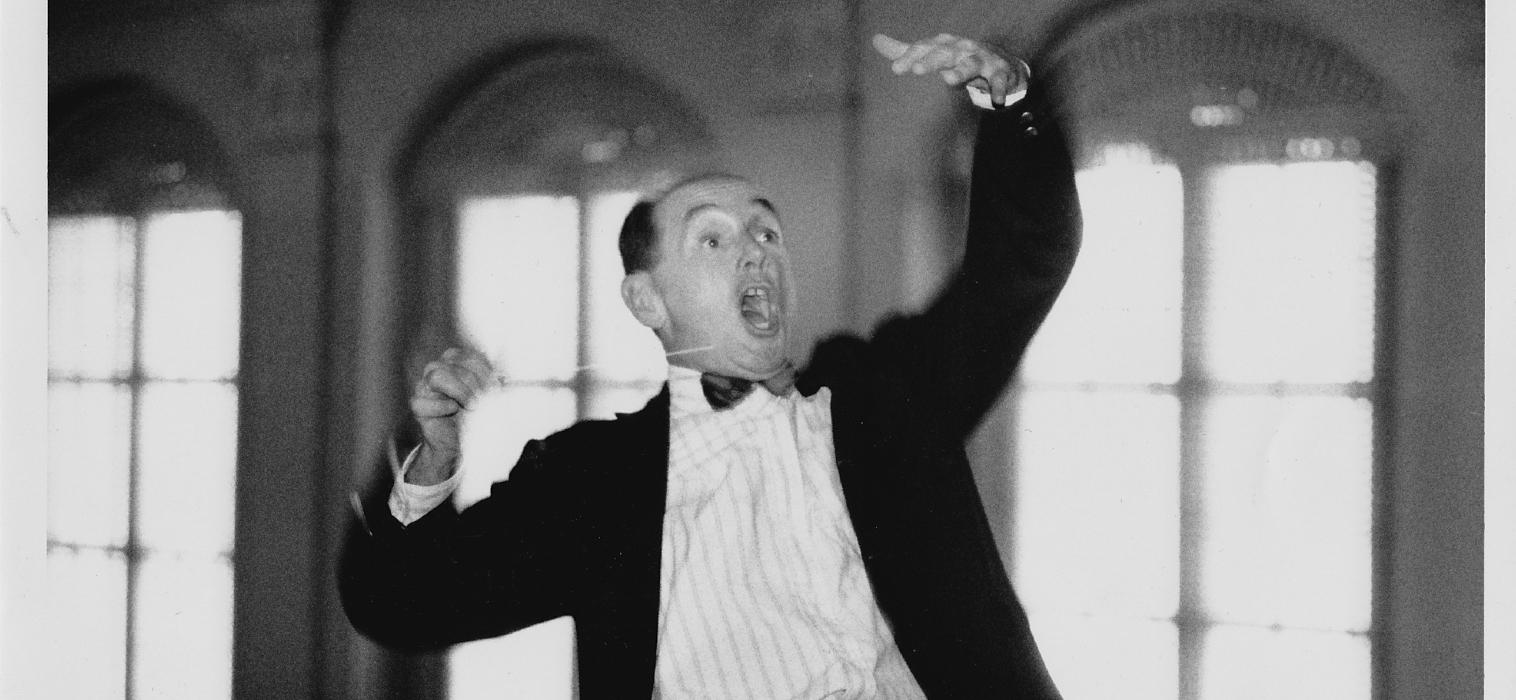The Maestro
During their nearly 50 years with Moravian College, Richard Schantz and his wife, Monica, built a world-renowned music program and a musical community united by their love of the program and its impassioned, inspired leaders. Dick passed away on April 5, 2020. We imagine him now conducting heaven’s choir.
By Bryan Hay ’86
It would start with a deep, juicy breath followed by an unfurled wingspan that signaled an unambiguous cue, as if he prepared to catch a fast-approaching column of air possessing all of his musical understanding and interpretation. Well-prepared singers who captured the moment would be rewarded with the sight of his hand pulling open his jacket and indicating a happily beating heart; anyone missing the mark would receive a deeply disappointed expression. “I beseech you. You’re letting down the composer,” he’d say, clutching his baton with both hands.
For more than 40 years, Dick Schantz pulled music and nonmusic majors into his orbit on Moravian College’s south campus to be part of a musical community. Thrice-a-week choir rehearsals in Peter Hall were full of humor, with quick, often unexpected turns from the profane to the profound. If you sang with Dick and experienced his artistry and that of his partner and wife of 60 years, Monica, you’ll always be a Schantz kid, part of an extensive family of musicians and music lovers regardless of class year.
An Enduring Legacy
Richard Schantz, who passed away in April at age 91, joined the Moravian faculty in 1956, answering then-President Raymond S. Haupert’s call to establish a music department and create a choir of mixed voices for the men’s and women’s colleges, which had merged in 1954. Monica, who would serve as a faculty member and rehearsal accompanist and later chaired the music department, arrived three years later.
Dick combined the two college glee clubs to form the Moravian College Choir and blended each ensemble’s Christmas programs into one large service, the first of which was held in Central Moravian Church in 1957. Popular from the start, the Moravian College Vespers, with Dick’s elegantly conceived pageantry and artful choice of repertoire, soon expanded to six services. Dick started work on Vespers in the summer, always insisting that the music match the liturgical calendar, which is why all of his Vespers programs included a Magnificat. Over the course of his career at Moravian, he conducted 240 Vespers services.
Remembering Dick Schantz
Roger Martin, president of Moravian College and Theological Seminary, 1986-1997
Susan and I are so sad to hear of Dick’s passing. Over the 11 years I was president of Moravian, Susan and I had the honor and pleasure of attending so many wonderful Vespers services all done under the leadership of Dick and Monica Schantz. But what I remember most about Dick was his infectious smile, his commitment to perfection, and his generous friendship. To me, Dick, along with his wife Monica, exemplified the best of Moravian College, and he will always hold a special place in our hearts.
Rev. Norman Prochnau ’58, a retired Moravian minister who sang in Moravian College’s first mixed choir, recalls that there were 35 to 40 singers in the choir and that Dick’s infectious charisma brought the men and women together with ease and established an immediate chemistry.
“A tradition of musical excellence began right away,” says Prochnau, who sang in Dick’s choirs for decades after graduating from Moravian. “I grew up in a musical home, and I must say that Dick and Monica built up a wonderful music program. Music remains a very outstanding part of college life at Moravian; that is the greatest legacy that they left.”
The vast Schantz legacy also includes the restoration of the 1748 Brethren’s House in the 1970s and the building of Foy Concert Hall, which opened in 1982, the same year the Schantzes brought the bachelor of music degree program to campus. They facilitated the music program’s accreditation by the National Association of Schools of Music in 1993, and they founded the Music Alliance. In 2003, the Richard & Monica Schantz Music Scholarship Endowment Fund, which supports Moravian College music students, was established in honor of Dick’s 75th birthday.
Dick’s pursuits outside of Moravian College included a passion for painting—his extensive collection of watercolors chronicles his world travels—that began at age 12 when he received an award to study at the Baum School of Art, in Allentown, Pennsylvania. He directed concerts for the Bach Choir of Bethlehem and directed or served as a staff member of six Moravian Music Festivals, providing additional performance opportunities for Moravian students and alumni and exposing Moravian composers to a broader audience. And from 1971 to 2002, he served as director of the Central Moravian Church Choir, with Monica as organist, often combining church and college choirs for tours and joint Thursby and Johnston memorial concerts.
Remembering Dick Schantz
Philip A. Gottshall ’65
I entered Moravian College as a freshman in September 1961. I met Mr. Schantz in Johnston Hall during an orientation program. He persuaded me to join the choir. I was a biology major and a chemistry minor student. My course load was filled with labs, so my time was limited, but I joined the choir. It was wonderful! The choir enhanced my whole college experience. Mr. Schantz led us all the way. He was always stopping us during rehearsals with his aim to highlight the best of each piece and us. He was a perfectionist and wanted the best from us. Mr. Schantz would often say that if we affected one person, we did our best. We affected many in the audience.
The choir took several bus trips for out-of-town performances. On a trip out west, we stopped for dinner at a restaurant, but the Black students in the choir were not permitted. With Dick leading the way, the whole choir walked out. I was so proud.
I attend the Vespers services every year. I also attended the Night of Stars when the college honored the Schantzes. We drank a scotch, and I toasted them for being at Moravian College and making my college experience so joyful. I will miss him.
One of Dick’s greatest musical joys came in retirement when he formed the Tuesday Singers in the fall of 2005. A group of people who sang with the Schantzes at Moravian College and Central Moravian Church, the ensemble prepared eclectic repertoire chosen by Dick, and they presented public rehearsals for nearly a decade.
Raised in a Mennonite-Lutheran home, the boy from Emmaus, Pennsylvania, graduated from Gettysburg College with a degree in history, although he had been encouraged to pursue a career in music. That became his path forward, as he studied at Juilliard, the School of Sacred Music at Union Theological Seminary, Tanglewood, and Concordia College, where he fell under the influence of conductor Paul J. Christiansen, whose Christmas program influenced Dick’s Moravian College Vespers. He met Monica in the mid-1950s at Concordia; they married in 1959.
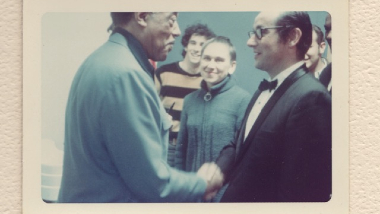
Duke Ellington and his orchestra came to campus for the Fourth Bethlehem Festival of the Arts on May 25, 1969, and performed with the Moravian College Choir in Johnston Hall.
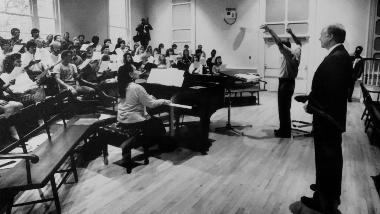
On October 15, 1990, President Jimmy Carter spoke at Moravian. At a press conference in Hearst Hall, Carter “heard angels singing in the next room” (Peter Hall). He walked over to listen to the choir and wiped tears from his eyes when they finished.
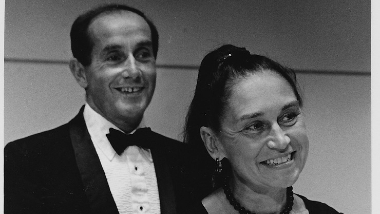
Dick and Monica Schantz
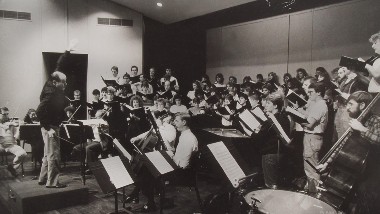
Remembering Dick Schantz
Since first I saw your face
I resolv'd to honour and reknown ye.
These first two lines of Thomas Ford’s madrigal—a favorite of Richard Schantz and often performed by his choirs—aptly describe the sentiment held by many of Dick’s students.

August 22, 2017, in the Blue Ridge Mountains of North Carolina, “I was walking behind [my father] when he spontaneously raised his arms...and with his instinctive conducting gesture declared, ‘Nature is the supreme conductor!’” Susanna Schantz recalls.
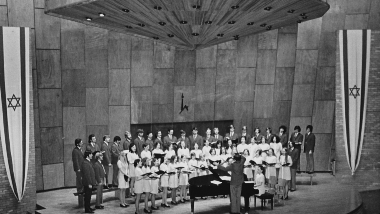
"I recall our singing at Hebrew University Aaron Copland’s “In the Beginning,” with its soaring, triumphant, 12-part-harmony finale, and being met at its end with a long silence, followed by a tentative few claps, then a roar of response as the audience surged
to its feet after having been so emotionally moved by the experience that they needed
a few moments of silence to process it. I will never forget that moment."
—Debra Dion Faust ’73
The Love of a Community
Dick imparted his rich choral music experience, humor, and warmth to generations of students and colleagues. As they remember him, they place a hand over a happily beating heart.
Moravian College Vice Provost Carol Traupman-Carr ’86 enjoys the distinction of being a Schantz student and chorister and a Schantz peer upon returning to Moravian to teach after receiving her doctorate in musicology from Cornell University. She remembers how Dick’s preparation could suspend singers in a specific time and place, and she cherishes his interpretation of Josquin Desprez’s soulful motet Tu pauperum refugium, which he frequently programmed. “It was just a perfect moment that allowed you to be transported back in time to a gigantic, dark cathedral,” Traupman-Carr says. “And so pieces like that, they just stuck with me. For people who sang with Dick, the music was more than just something we had to do to get through a semester. Every piece came to have real meaning for us, with different meanings in different contexts. And we felt connected to each other in the choir and connected to him.”
Larry Lipkis, professor of music and composer in residence, credits the Schantzes for launching his career when he came to Moravian in 1979 and guiding him “lovingly and attentively” through his formative years as a budding composer and a “wet behind the ears” professor, barely two years older than his students. “I viewed the Schantzes as my musical Rocks of Gibraltar that formed a foundation of knowledge and skills upon which I could grow and develop my own abilities,” he says. “I will be eternally grateful to them both for their mentoring and their friendship.”
Lipkis learned quickly that, with Dick, very little was safe from double entendres, puns, and implied meanings, he says, recalling Dick’s probing exploration of double meanings in his song “Open-faced Tarts.”
“Anecdotes aside, my most cherished moments with Dick occurred often but fleetingly, usually in hallways, as we recalled our favorite works and performances—colleague to colleague and friend to friend,” he says. “When he retired, I sorely missed this affectionate bonding. It was as though a light in my life had suddenly dimmed. Now that light is finally extinguished, but its warm glow lives on in my memory.”
Remembering Dick Schantz
Linda Shears Krick ’74
I was a music major at Moravian from 1970 to 1974. Dick Schantz was the biggest musical influence in my life. Every choir rehearsal was an education on how to make beautiful music and how
to have fun at a rehearsal but still be on task. Our trips out of the country were so much fun and full of wonderful memories. Throughout my four years, Dick and Monica were my substitute parents as well as my teachers. After I graduated, good memories were made at choir reunions. It was wonderful to see choir members from different eras and the relationship Dick had with every one of them. He was a warm and generous man and will not be forgotten!
Dennis Duda ’73, who served as music department administrator for more than a decade, developing programming and managing concert tours, had a front-row seat to observe Dick’s personal connection to students or whoever would come through the Brethren’s House. “I always admired the time he took with each student, families who were visiting, or prospective students when they would come in for a tour,” Duda says. “Dick invested so much personal time with many, many students that it made them feel like part of a family. I can’t even recall once where he would turn a student away. It was always right then and there, or soon thereafter. That’s the personal connection he always strove to establish.”
Stephanie DiFelice-Heavens ’95 and ’96 unexpectedly encountered Dick’s informal hospitality during her first visit to the music department as a high school senior. “It was prospective student day, 1991, and it was pouring rain,” DiFelice-Heavens says. “My mom, aunt (a 1963 alumna), and I came down to the Brethren’s House to look around. Resembling drowned rats, we somehow found ourselves on the third floor, and Mr. Schantz came out of his office.” He invited them in and spent an hour talking to DiFelice-Heavens about her singing experience, writing everything down on a yellow pad. “It was an impromptu meeting, but he had taken the time to really get to know me and know how much I loved singing.”
About two months later, she received four Vespers tickets in the mail accompanied by a note: “To a future singer. Much love, Richard Schantz.” A month later, she accepted an early decision to Moravian and auditioned for the choir. Responding to his questions during her audition, DiFelice-Heavens replied that she wasn’t a music major. Dick shot back with “you will be.” The following year, she dropped her English and elementary education major and selected music education.
Remembering Dick Schantz
Bryan Hay ’86 and
Jennifer Ritenour Hay ’86
Just about every course we took at Moravian College required a high level
of participation, intellectual rigor, and meaningful interactions with faculty, many of whom remain close friends and mentors to this day. But with Dick, the relationship was spiritual. Making music with Dick and Monica Schantz was the most important thing you could do in any rehearsal or performance moment. That time was sacred space. It’s been said that music decorates time; to that, Dick was the most gifted decorator we’ve ever encountered. When you saw his arching, out-of-body movements and heard his deep breath propelling and coaxing a musical line forward during
his conducting, everyone was drawn into his realm of text and music. His classic gesture, a patting over his heart, always indicated his delight. It was a sign that the most important thing at that highly decorated moment in time was executed with success.
After Moravian, we continued with the Schantzes at Central Moravian Church and the Tuesday Singers, developing a bond that evolved into an extended family. We celebrated holidays and life’s milestones. How strange it seems to no longer receive a spontaneous phone call to share some gossip or to receive a concert review in the mail with Dick’s poetic commentary penned in his angular script. But the memories and experiences will have an eternal staying power.
Even non-Moravian students seeking a musical path found refuge on south campus during the Schantz years. John Schultz was an undergrad at Lehigh University in the late 1960s “trying to create a degree in music where none existed.” He finally received permission to cross the Lehigh River and take music courses at Moravian, completing his blue-and-grey-infused Lehigh music degree in 1970. “From the first, Dick and Monica welcomed me into their Moravian community and provided a most excellent music and personal foundation for my future studies,” says Schultz, who earned a doctorate in choral conducting from the University of Illinois. “ They invited me, a Lehigh sophomore in my first year with Moravian, to join the Moravian College Choir for their European tour in 1968, as they lacked tenors.”
An intrinsic love and passion for music will be Dick’s permanent legacy, says Cathy Spallitta ’77, a long-serving Schantz singer who still anchors the soprano section at Central Moravian Church. Like so many others, she first encountered Dick on the third floor of the Brethren’s House when she came to check out Moravian. “I was sitting in one of those pews lined up in the hallways, and all of a sudden this slender gentleman with a goatee, his glasses kind of cocked on his face, dashed by, full of energy,” Spallitta remembers. “He was like a can of soda that had been shaken up, ready to unleash its energy.”
“He was about giving it his all not only for each and every performance but also in rehearsals because he wanted us to do so as well,” she says. “So every time you stepped on a stage or a balcony, you needed to do your level best. And also, while you were doing it with him, you could just embrace the wonder and the music that God has given us to share. Dick gave it his all every single time.”
Bryan Hay ’86 graduated from Moravian College with
a degree in journalism and a concentration in music. A professional trombonist, he played and sang with Dick Schantz at Moravian College, Central Moravian Church, and Moravian Music Festivals, and with Tuesday Singers. Hay is a content manager in the Communications Division at Lafayette College.
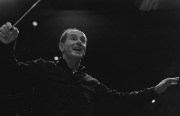
Listen at mrvn.co/Schantz ...
...to this sublime 1995 recording of the Central Moravian Church Choir, conducted by Richard Schantz, singing a chorus from Mendelssohn’s unfinished oratorio Christus. They are led by soloist Cathy Spallitta ’77. “The Schantz ritual at Christmas is to listen to this together and talk about how this is the best recording of this piece in existence,” says Dick Schantz’s daughter, Susanna Schantz, who also sang in this choir.
Remembering Dick Schantz
Debra Dion Faust ’73
Standing by the piano in Professor Schantz’s office in the fall of 1969, auditioning for the choir, I had no idea how much my acceptance would shape my experience at Moravian and my reminiscences after. My first choir retreat that fall taught me to bring my sleeping bag along each September so I wouldn’t freeze while learning the first semester’s music. I still have my burgundy “MCC” blazer, worn for informal concerts, and I made my first formal concert dress—a full-length black dress with wrist-length sheer sleeves—for my first Vespers that December. The exhilaration of singing the “Ideo” (“Personent hodie,” which we sang as a recessional) for an audience at Central Moravian Church stays with me.
A high point of my choir experience was taking a performance trip to Bethlehem, Israel, during Jan Term my junior year. Several memories stand out:
• During our visit to the Church of the Holy Sepulchre, we set up risers in the foyer to have a group photo taken, and while we were in formation, Professor Schantz instructed us to begin singing a Gabrieli “Sanctus” that was part of our repertoire. An Eastern Orthodox priest came tearing out of his side of the church, shushing us, telling us, “Here we sing only to the glory of God.” Professor Schantz apologized to him for our gaffe, then turned to us and quietly said, “Just what did he think we were doing?” Then a priest from the Roman Catholic side of the church approached him and said, “I don’t think God would be offended if you sang for us.” So after the photo shoot, we went into the church, treating the request like a Vespers service, singing our way up the aisles to the front of the church, where we performed a few pieces and recessed to the “Ideo.” I distinctly remember hearing doors quietly opening and closing in the clerestory as members of the order crept in above us to listen to our impromptu concert.
• On our last Saturday in Israel, we stood in the foyer of the St. George Hotel awaiting a bus to take us to perform at Hebrew University. The bus was running very late, so Professor Schantz began to warm us up and started us singing. We attracted a small crowd, both patrons of the hotel and people off the street, asking who we were and what we were doing. After he explained, the locals figured out who the tardy bus driver was and sent a delegation to hustle him back to the hotel. His jaw dropped as they somewhat strong-armed him into the hotel and said to him, “Do you want them to miss this?” He got us to the university just in time.
• Finally, I recall our singing at Hebrew University Aaron Copland’s “In the Beginning,” with its soaring, triumphant, 12-part-harmony finale, and being met at its end with a long silence, followed by a tentative few claps, then a roar of response as the audience surged to its feet after having been so emotionally moved by the experience that they needed a few moments of silence to process it. I will never forget that moment.
All in all, I remember with great appreciation rehearsals with Monica and Dick Schantz before concerts or Vespers in Central Moravian, as well as those late-afternoon Monday, Wednesday, and Friday rehearsals in the music building, and I hope that I was able to give my students a similar growth experience to the one that the Schantzes gave me.
Debra Dion Faust ’73 was an English teacher and drama advisor at Ipswich High School in Ipswich, Connecticut, for 29 years.
Vespers Exhibit, Richard Schantz Tribute Opens in December
History of the Moravian College Christmas Vespers, a new exhibit in tribute to Richard Schantz and curated by Cory Dieterly, Moravian College and Moravian Theological Seminary archivist, will be on display in the Haupert Union Building (HUB) from December 1 to January 15. The exhibit will include about 20 enlarged photographs from over the years. Because of COVID-19 restrictions, the exhibit will be open only to students, faculty, and staff, with plans to present it again to the public next year or as soon as conditions allow.
Beginning in December, a digital exhibit providing much more content, including photographs, videos, odes, and scanned documents, will be available on Reeves Library’s Digital Resources page at moravian.edu/special-collections.

